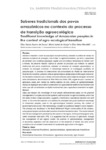Saberes tradicionais dos povos amazônicos no contexto do processo de transição agroecológica

Ver/
Use este enlace para citar
http://hdl.handle.net/2183/22309
A non ser que se indique outra cousa, a licenza do ítem descríbese como Atribución-CompartirIgual 3.0 España
Coleccións
Metadatos
Mostrar o rexistro completo do ítemTítulo
Saberes tradicionais dos povos amazônicos no contexto do processo de transição agroecológicaTítulo(s) alternativo(s)
Traditional knowledge of Amazonian peoples in the context of agro-ecological transitionData
2015Cita bibliográfica
Ambientalmente Sustentable, 2015, 20: 1699-1717. ISSN: 1887-2417
Resumo
[Resumo] Valorizar e respeitar o saber da população local (etnociência), baseado na prática de manejo de sistemas complexos de produção, com ênfase na agrobiodiversidade, que tem a capacidade de alimentar uma numerosa população, sugere uma convivência harmoniosa do homem com a floresta. No presente trabalho objetiva-se abordar os princípios que norteiam os saberes tradicionais dos povos amazônicos, utilizados no processo de transição agroecológica, no contexto da educação ambiental. A metodologia baseia-se na investigação qualitativa de pesquisa-ação. O processo foi desenvolvido nas comunidades do Projeto de Assentamento Rural da Vila Amazônia, utilizando práticas agroecológicas aliadas práxis da Educação Ambiental. Os resultados mostraram que o manejo dos solos praticado pelos indígenas da região, formando solos antropizados, denominados de Terra Preta dos Índios (TPI), sugere-se que o sucesso da agricultura, passa pelo manejo da matéria orgânica do solo, pratica da agrobiodiversidade, manejo da vegetação secundaria e a observância da capacidade de resiliência das florestas e dos solos, que são consideradas condições fundamentais para a agricultura sustentável na região.Astract [Abstract] Value and respect the knowledge of local people (ethnoscience) based on the practical management of complex production systems, with emphasis on agro-biodiversity, which has the ability to feed a large population, suggests a harmonious coexistence between man and forest. In this work the objective is to address the principles that guide traditional knowledge of Amazonian peoples, used in the agro-ecological transition process, the context of environmental education. The methodology is based on qualitative research action research. The process was developed in the Rural Settlement Project communities of Vila Amazon, using agroecological practices allied practice of environmental education. The results showed that the soil management practiced by the natives of the region, forming anthropogenic soils, called amazonian dark earth (TPI), it is suggested that the success of agriculture, through the management of soil organic matter, the practice of agrobiodiversity, management of secondary vegetation and the observance of the resilience of forests and soils, which conditions are considered fundamental for sustainable agriculture in the region.
Palabras chave
Educação ambiental
Etnociência
Agrobiodiversidade
Agroecosistemas amazônicos
Environmental education
Ethnoscience
Agricultural biodiversity
Agro Amazon
Etnociência
Agrobiodiversidade
Agroecosistemas amazônicos
Environmental education
Ethnoscience
Agricultural biodiversity
Agro Amazon
Dereitos
Atribución-CompartirIgual 3.0 España
ISSN
1887-2417






